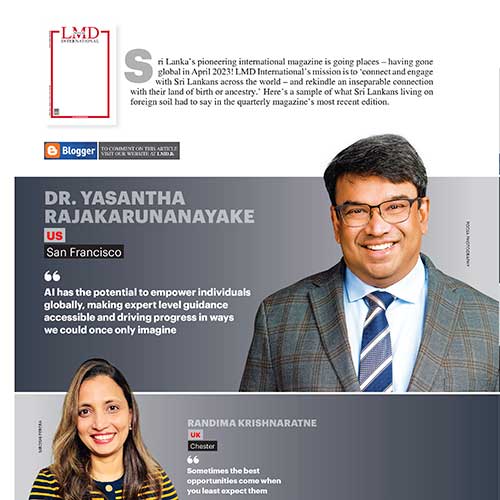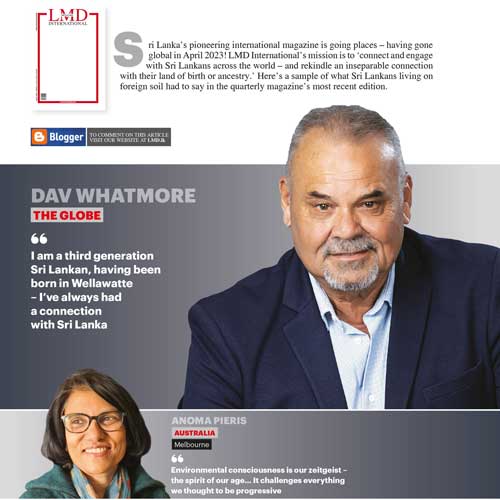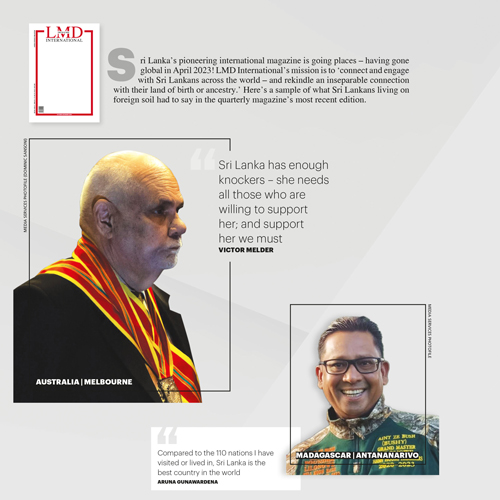SRI LANKANS OVERSEAS
VISIONARY OUTLOOK
Herman Kariyawasam envisions a nation with farsighted goals
Q: How do you perceive Sri Lanka today?
A: Sri Lanka is progressing albeit slowly. The Easter Sunday incident directly impacted all sectors.
The agricultural and industrial economy must be strengthened to develop the nation, and reduce unemployment. To achieve this, Sri Lankans must stand as one and change individual mindsets.
Sri Lanka is quite reliant on imports, and there’s a lack of encouragement from the authorities to develop local industries and agriculture. Until and unless the vision translates into a mission, there will be stagnation. The entire process should change to benefit the nation rather than serve political agendas.
A major share of national income is reserved to maintain the political administration. Are so many politicians required to rule such a small country? Their number must be reduced to a handful.
Q: Is Sri Lanka regaining its composure following the Easter Sunday attacks?
A: Yes. It was an eye-opener for the entire nation. The public is now more concerned and aware of the need to instate protocols to avoid such threats.
Q: How do compatriots in the UAE view Sri Lanka?
A: They feel that Sri Lanka can develop by learning lessons from 4/21 and the civil war. Sri Lanka could be stronger under proper guidance and by considering its future.
Q: Likewise, how do other Sri Lankans living in the UAE view their country of birth?
A: Sri Lankans here believe that the nation can stand up for progress given its resources and skills.
Productivity must be measured in every vocation from politicians to labourers. There needs to be stringent education criteria for those who want to be politicians along with limitations on their perks and period of service.
The facilities provided to urban areas should be available to rural communities too. This does not mean harming the tranquillity of rural areas but preserving nature while ensuring development.
Q: What were your impressions of Sri Lanka on your last visit?
A: On my last visit in June 2019, I observed a slight improvement in certain industries but not to the desired level. Tourism is a major source of revenue but has the industry been safeguarded to avoid future threats?
The economy has declined drastically and sources of income have decreased. Earning a living has become a challenge for the public. And values and virtues are fading by the day.
Q: When it comes to news about Sri Lanka, what mediums do you rely on to stay connected?
A: Official Sri Lankan e-news channels, social media, e-newspapers, YouTube and so on.
Q: How do you view the brain drain – and why hasn’t there been a reversal of it?
A: It is a huge loss to Sri Lanka and due to the lack of the latest education curriculums, benchmarks for universities and colleges catering to those who don’t make the cut for public universities.
Well-paid jobs based on skills and qualifications are scarce so there’s economic and social insecurity. There is political influence in the professional, government and individual sectors, as well as minimal measures to improve productivity.
Q: What should Sri Lanka focus on most in the coming decade?
A: Growth in social standards, the livelihoods of Sri Lankans and a stable economy. It must work towards an unchanging and successful plan for over 50 years by laying the foundation today.
Farsighted leadership is necessary to transform a vision into a mission. The public has a responsibility to appoint visionary leaders by considering the country’s growth instead of personal agendas. Such plans must not be altered with changes in the administration. And fewer politicians must be elected, while mergers in certain government authorities are mandatory.
It’s important to preserve nature, which no industry should harm. Sri Lanka needs to focus on solar power, the potential energy of ocean waves and lowering CO2 emissions. In terms of ensuring adequate sanitation standards in all cities and towns, this can be supported by CSR projects.
Moreover, developing the IT industry by attracting multinational companies would help reduce unemployment.
Q: And what are your hopes for the country in the next decade or so?
A: The youth is our hope. Sri Lanka must revive the virtues and values of the past, and respect everyone. It must preserve nature for the next generation. New syllabuses are required in the education system. More technical colleges and universities, and better health services, need to be established.
In the next couple of decades, we’ll have a generation that can drive a plan beyond 50 years.











